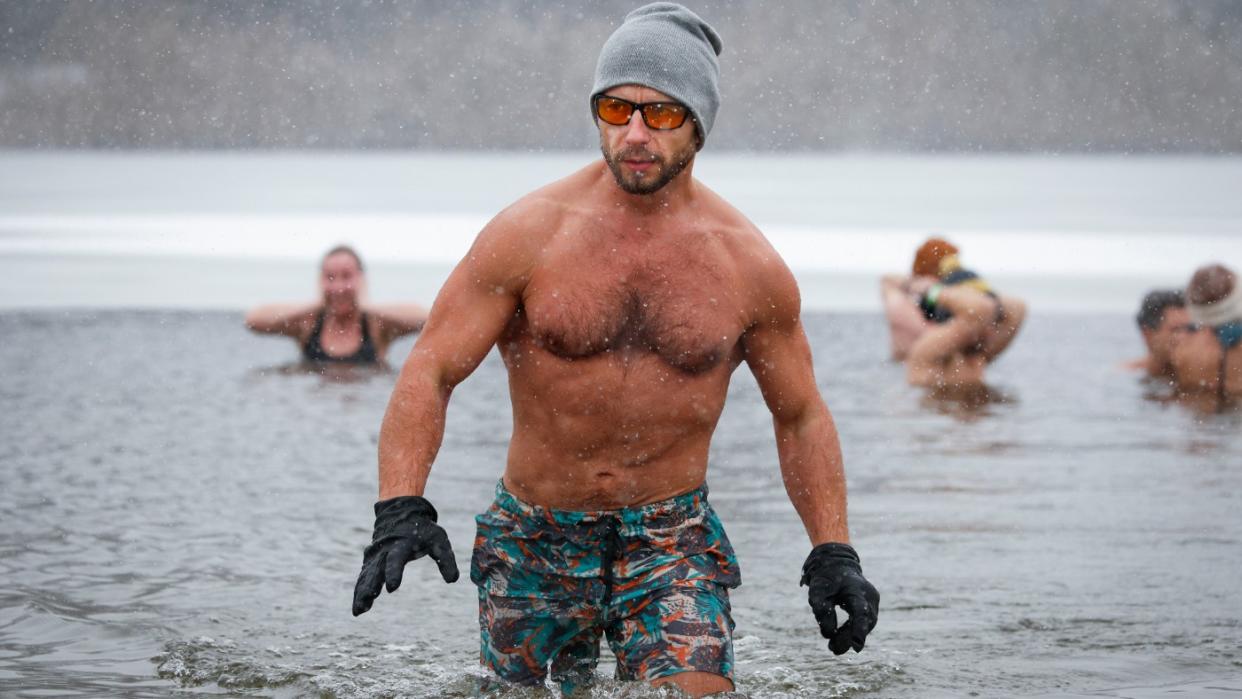Pros and cons of cold-water swimming

The mere thought of it might make you shiver, but outdoor swimming has long been a feature of the Christmas period.
People have touted the health benefits of cold water for centuries, all the way back to Hippocrates in 400 BC, and outdoor swimming has a long tradition, particularly in northern countries. But Wim Hof, a Dutch fitness and health guru, is widely credited with bringing the idea of cold-water immersion "from the fringes of bohemia into the medical mainstream", said The Daily Telegraph.
The Wim Hof method specifically involves soaking in an ice bath or taking a cold shower, but practitioners "have turned to a more active version to manage their mental health", said The New York Times. Enthusiasts speak of numerous benefits, including a boost to the immune system, improved mental health and a sense of euphoria.
But the potential dangers of outdoor swimming have been "put under the microscope" again, said the London Evening Standard, after a recent inquest into the death of a woman last year. Kellie Poole, 39, drowned in April 2022 after collapsing back into a Derbyshire river. The inquest found in September that an undiagnosed heart condition and immersion in cold water was "likely" to have prompted her cardiac arrest, with the coroner describing the lack of regulation over cold-water swimming as a "concern".
So before taking the plunge, amateur enthusiasts should take care to weigh up the pros and cons.
1. Pro: immersion is a mood booster
Cold-water swimming is an "instant mood booster", said Woman & Home. A study by scientists in Prague found in 2000 that cold-water immersion can boost dopamine levels by 530%.
A separate study, published in the British Medical Journal in 2018, suggested that open-water swimming could be used to treat some cases of depression.
In 2020, a study in Britain found that 61 people who took a 10-week course in cold seawater swimming experienced more improvement in mood and wellbeing than their 22 friends and family who watched from shore.
Mental Health Swims, a non-profit organisation that arranges cold-water swimming throughout Britain, has grown from one meet-up group in 2019 to more than 80 this year, noted the NYT. However, "the science behind how or why cold water affects mental health is still unclear".
Obtaining strong evidence is challenging, Jeremy Howick, a senior researcher at the Centre for Trials Research at Cardiff University, told the paper. Positive expectations of cold-water treatment may lead to a placebo effect, he added.
2. Con: risk of heart danger
Cold-water swimming "could spell trouble" for people with heart issues, said Harvard Medical School's Massimo Ferrigno, because the "shock of cold water" shifts "even more blood to the chest, taxing the heart". It can also "lead to a lower heart rate and higher blood pressure".
Being in colder water "may provoke irregular heart rhythms", agreed the British Heart Foundation.
People with "obvious or as yet unrecognised cardiovascular pathologies" can be more prone to adverse effects, a study found in 2020.
3. Pro: metabolism booster
Want to offset your Christmas lunch? Swimming in cold water "causes your body to react in order to produce more heat and maintain your core temperature", said Circle-One, which will "increase your metabolism, burning fat in order to keep warm".
A Scandinavian study of men who went winter swimming two or three times a week found that they use the equivalent of around "500 extra calories per 24 hours on average compared to other people", reported the Daily Mail.
A cold swim can also increase your basal metabolic rate, meaning you burn off more calories afterwards, Dr Mark Harper, sea swimmer and a member of the Outdoor Swimming Society, told BBC Earth.
4. Con: dirty water
Raw sewage is being pumped into rivers and the sea at an increasing, worrying rate. Not one river in England is free from chemical contamination, according to a 2022 House of Commons Committee report, and only 14% of UK rivers had a "good" ecological status.
Thames Water was fined more than £3 million in July, after millions of litres of raw sewage flooded into two rivers in southern England.
According to a citizen science survey in July, one in 10 people are falling ill from swimming in polluted or contaminated rivers – although, notes the i news site, "it cannot be definitively proved that [pollution] was the cause of any illness".
Even so, the figures provide "valuable evidence" about the potential health risks of outdoor swimming in the UK.
5. Pro: immunity booster
Swimming in cold water is believed to be beneficial to the immune system because it can help to boost the white blood cell count when the body is forced to react to changing conditions
For instance, a study carried out by Czech scientists linked cold-water immersion to invigorating the immune system and an increase in white blood cell count and antioxidant levels.
6. Con: hypothermia risk
There is a danger of hypothermia, which sets in when the body temperature drops to below 35°C and can be fatal.
Hypothermia can "catch you unawares", said Outdoor Swimmer, and "not everyone shows the same symptoms". You can "often still be able to swim, feed and answer questions despite it, and never complain of being cold or feel excessively cold".
"Even in really cold water it takes at least half an hour for you to become hypothermic," said Practical Boat Owner, but "when you get out" it "becomes a more likely risk", so it's important to warm up as fast as you can.

